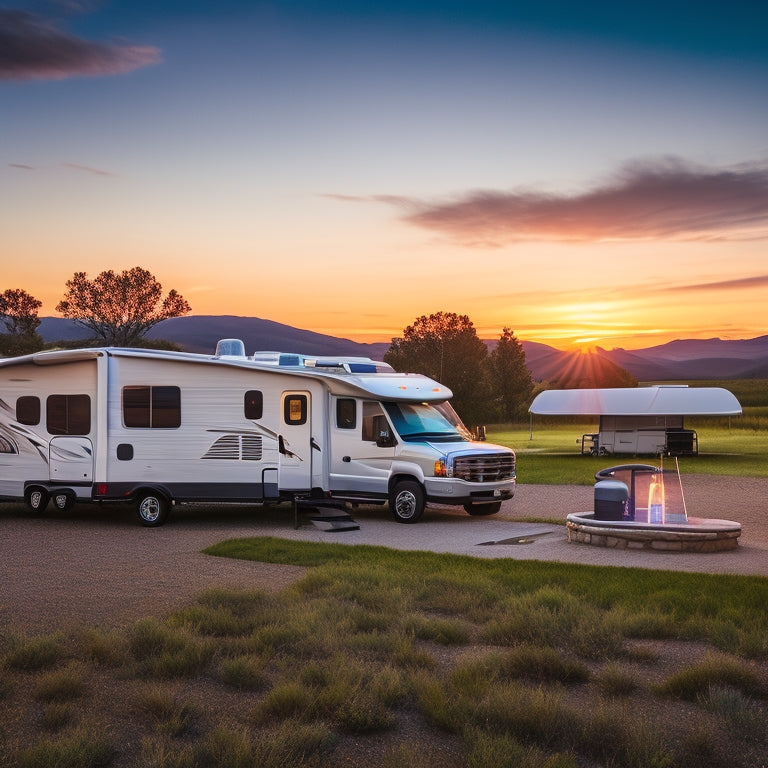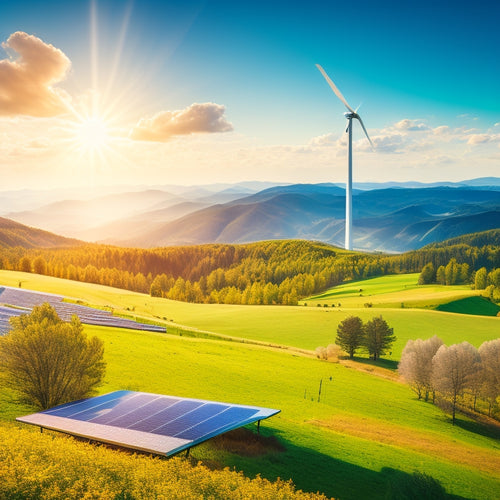
Maximizing RV Energy Efficiency With Renewable Panels
Share
You're looking to maximize your RV's energy efficiency with renewable panels, and that's a smart move. To get the most out of your solar setup, you'll want to choose high-efficiency panels, optimize their placement and angle, and manage your energy consumption effectively. Consider factors like panel type, energy conversion rates, and battery solutions that meet your specific RV demands. By making informed decisions and fine-tuning your system, you can greatly reduce your energy costs and carbon footprint. Now, let's explore deeper into the details that will take your RV's energy efficiency to the next level.
Overview
- High-efficiency solar panels (exceeding 20% efficiency) are ideal for off-grid travel, considering specific RV demands and terrain.
- Proper panel placement and angle, including adjustable tilt mechanisms, maximize energy production and absorption.
- Conduct energy audits to pinpoint inefficiencies, prioritize power allocation, and implement power management strategies to reduce consumption.
- Select suitable battery solutions, such as lithium-ion, and maintain them through regular charging, monitoring, and cleaning to ensure optimal performance.
- Invest in performance tracking systems and routine inspections to identify areas for improvement and optimize RV energy efficiency.
Understanding Solar Panel Efficiency
Optimizing your RV's energy efficiency relies heavily on understanding solar panel efficiency, an essential aspect of harvesting renewable energy.
You'll want to grasp how different solar panel types convert sunlight into electrical energy. Monocrystalline, polycrystalline, and thin-film solar panels vary in energy conversion rates, with monocrystalline panels boasting the highest efficiency rates.
Understanding energy conversion is imperative, as it directly affects your RV's energy output. Furthermore, when it comes to solar battery solutions for rural electrification, deep cycle capabilities play a significant role in providing reliable power.
Similarly, within the framework of RV energy efficiency, selecting the right solar panels is essential. When selecting solar panels, consider the energy conversion rate, measured in watts per hour (W/h). A higher W/h rating indicates greater energy production.
Choosing the Right Solar Panels
When selecting the right solar panels for your RV, you'll need to weigh factors beyond just energy conversion rates, considering the specific demands of your rig and the terrain you'll be traversing.
High-efficiency solar panels, exceeding 20% efficiency, are ideal for off-grid travel, as they yield more power per unit area.
You'll want to choose a solar panel type that suits your needs, such as monocrystalline, polycrystalline, or thin-film panels. Each type has its advantages and disadvantages, so it's important to research and compare their performance, durability, and cost.
Installation considerations are also significant, including the panel's size, weight, and mounting options. You'll need to confirm the panels are securely attached to your RV's roof or hood, and that the installation doesn't compromise your vehicle's aerodynamics or structural integrity.
Optimizing Panel Placement and Angle
When positioning your solar panels, you'll want to take into account the ideal tilt and orientation to maximize energy production.
It's crucial to select high-efficiency panels with a minimum 25-year warranty to guarantee reliable energy production.
Next, you'll need to analyze the roof space for potential shading and obstructions that could reduce panel efficiency.
Panel Tilt and Orientation
Two key factors in utilizing maximum energy from your RV's solar panels are the tilt and orientation of the panels. Proper tilt and orientation guarantee that your panels absorb the most sunlight possible, resulting in increased energy production.
You should consider the type of panel materials you're using, as some are more efficient at certain angles than others. For instance, south-facing roofs optimize performance, so if your RV's roof receives direct sunlight, you may want to adjust your panel's tilt accordingly.
Invest in tilt mechanisms that allow you to adjust the angle of your panels based on the time of day and season. This flexibility will help you capture more energy from the sun.
Shading and Obstruction Analysis
Most of your RV's solar panels are susceptible to shading and obstruction, which can drastically reduce their energy output.
To optimize panel placement and angle, you need to conduct a thorough shading and obstruction analysis. Assess the site's light conditions, considering seasonal variations that affect solar access.
Identify shading sources, such as trees, buildings, and other environmental factors, and obstruction types, like vents, antennas, or skylights.
Evaluate the surroundings' impact on your RV's solar panels, taking note of potential obstructions.
Roof Space Optimization
Every available inch of your RV's roof space is essential for maximizing energy efficiency.
When optimizing panel placement and angle, consider the type of roof materials you have, as they can affect solar integration. Weight considerations are critical to maintain structural integrity, so select panels that balance energy output with weight constraints.
Design aesthetics also play a role, as a sleek installation can enhance your RV's appearance. Guarantee proper ventilation solutions to prevent overheating and reduce energy loss.
Mastering installation techniques is fundamental to secure your panels and withstand various weather conditions.
Managing Energy Consumption Effectively
You can considerably reduce your RV's energy consumption by identifying and addressing energy waste, monitoring your power usage in real-time, and optimizing the efficiency of your appliances.
By taking these steps, you'll be able to pinpoint areas where energy is being wasted and make data-driven decisions to minimize your energy footprint.
Reduce Energy Waste
By optimizing your RV's energy usage, you'll not only reduce your environmental footprint but also save money on fuel and extend the lifespan of your batteries.
To reduce energy waste, start by conducting an energy auditing to identify areas of inefficiency. Insulation upgrades can make a significant impact, as heat gain or loss can severely drain your energy resources.
Check for air leaks, seal gaps, and consider upgrading to energy-efficient windows. Additionally, replace incandescent bulbs with LEDs and unplug appliances when not in use to eliminate standby power consumption.
Monitor Power Usage
A dashboard display of your RV's energy usage can be a powerful tool in managing energy consumption effectively.
You'll be able to track your power usage in real-time, identifying areas where you can cut back and optimize your energy efficiency. This power monitoring system allows you to make informed decisions about your energy usage, reducing waste and conserving power.
With accurate usage tracking, you can prioritize your energy needs, allocating power to essential systems and appliances.
Optimize Appliance Efficiency
Incorporating energy-efficient appliances into your RV's design is essential for managing energy consumption effectively. You can achieve this by investing in appliance upgrades with high energy-saving settings.
For instance, efficient cooking appliances and advanced refrigeration techniques can greatly reduce power usage. Implementing power management strategies, such as load balancing and smart devices, helps optimize energy distribution.
Additionally, ensuring inverter efficiency and checking appliance ratings can help you identify areas for improvement. Conducting regular energy audits will help you pinpoint energy-hungry devices and make informed decisions about upgrades or replacements.
Battery Selection and Maintenance Tips
Your RV's battery is the heart of its electrical system, pumping power to essential systems like lights, refrigerators, and water pumps.
When selecting a battery, you'll need to take into account the type: flooded, AGM, or lithium-ion. Each has its pros and cons, so choose one that suits your needs. For example, lithium-ion batteries are ideal for full-time RVers due to their high energy density and long lifespan.
To maintain your battery's health, practice good maintenance habits. Check the electrolyte levels, charge the battery regularly, and avoid deep discharging.
You should also keep the terminals clean and secure, and monitor the battery's state of charge. By doing so, you'll guarantee your RV's electrical system runs smoothly and efficiently, giving you the freedom to travel without worrying about power outages.
Monitoring and Maintaining Performance
As you guarantee your battery is in top condition, it's equally important to keep tabs on your RV's overall energy performance.
You'll want to implement performance tracking to identify areas for improvement. Conduct routine inspections to detect potential issues before they become major problems.
Regular energy audits will help you pinpoint energy-wasting components and opportunities for system upgrades.
Be mindful of environmental factors that impact your RV's energy efficiency, such as temperature and humidity.
Analyze data to set efficiency benchmarks and adjust your maintenance schedules accordingly.
Frequently Asked Questions
Can I Use Solar Panels With a Generator or Inverter?
You can definitely use solar panels with a generator or inverter, as they're compatible; however, you'll need to guarantee the system's designed to handle the combined power output, optimizing generator performance and solar panel compatibility for maximum energy freedom.
How Do I Handle Shading From Trees or Other Obstructions?
You're worried that trees will ruin your solar setup, but don't let shading hold you back! You'll find the sweet spot by strategically placing panels to minimize obstruction, and exploring shading solutions like tilting or tracking systems to maximize energy harvest.
Are Solar Panels Durable Enough for Frequent Travel?
You'll be relieved to know that solar panels are built to withstand frequent travel and harsh weather conditions, requiring minimal panel maintenance; follow essential travel tips, like securing panels during transport and cleaning them regularly, to guarantee peak performance.
Can I Add More Panels to My Existing System Later?
You can easily scale up your energy independence by expanding your system later, as long as you guarantee new panels are compatible with your existing setup, making system expansion a seamless process.
Do Solar Panels Work Well in Cloudy or Cold Weather?
You'll find that solar panels still generate power in cloudy or cold weather, although their performance is reduced; cold temperatures can actually increase efficiency, but energy output drops considerably in low-light conditions, so plan accordingly.
Ready to Buy
As you've optimized your RV's energy efficiency with renewable panels, you've discovered a wealth of power-saving secrets. With the right solar panels, strategic placement, and smart energy management, you're utilizing the sun's boundless energy like a pro. And with exceptional batteries and monitoring, you're guaranteed a performance that's out of this world - literally, your RV's energy efficiency will soar to astronomical heights!
Related Posts
-

Renewable Energy Solutions to Reduce Your Carbon Footprint
To reduce your carbon footprint, adopting renewable energy solutions is key. Using solar panels or wind turbines can ...
-
Average Lifespan of Solar Battery Banks
The average lifespan of solar battery banks generally ranges from 5 to 15 years. This variation mainly stems from the...
-

Essential Hiking Lights for Safety and Fun
When you're hitting the trails, essential hiking lights are vital for safety and fun. A lightweight headlamp offers h...

